
The ZX Spectrum is an 8-bit home computer developed and marketed by Sinclair Research. Considered one of the most influential computers ever made, it is also one of the best-selling British computers ever, with over five million units sold. It was released in the United Kingdom on 23 April 1982, and around the world in the following years, most notably in Europe, the United States, and Eastern Bloc countries.

The Quill is a game creation system for text adventures. Written by Graeme Yeandle, it was published on the ZX Spectrum by Gilsoft in December 1983. Although available to the general public, it was used by several games companies to create best-selling titles; over 450 commercially published titles for the ZX Spectrum were written using The Quill.

Sabre Wulf is an action-adventure game released by British video game developer Ultimate Play the Game for the ZX Spectrum home computer in 1984. The player navigates the pith-helmeted Sabreman through a 2D jungle maze while collecting amulet pieces to bypass the guardian at its exit. The player does not receive explicit guidance on how to play and is left to decipher the game's objectives through trial and error. Sabreman moves between the maze's 256 connected screens by touching the border where one screen ends and another begins. Each screen is filled with colourful flora, enemies that spawn at random, and occasional collectibles.

Level 9 was a British developer of computer software, active between 1981 and 1991. Founded by Mike, Nicholas and Pete Austin, the company produced software for the BBC Micro, Nascom, ZX Spectrum, Commodore 64, Oric, Atari 8-bit computers, Lynx 48k, RML 380Z, Amstrad CPC, MSX, Amiga, Apple II, Memotech MTX, and Enterprise platforms and is best known for its successful text adventure games until a general decline in the text adventure market forced their closure in June 1991.

Colossal Adventure is a text based adventure game published by Level 9 Computing in 1982. It was originally released for the Nascom.

3D Monster Maze is a survival horror computer game developed from an idea by J.K. Greye and programmed by Malcolm Evans and released in 1981 for the Sinclair ZX81 platform with the 16 KB memory expansion. The game was initially released by J. K. Greye Software in December 1981 and re-released in 1982 by Evans' own startup, New Generation Software. Rendered using low-resolution character block "graphics", it was one of the first 3D games for a home computer, and one of the first games incorporating typical elements of the genre that would later be termed survival horror.

Underwurlde is a 1984 action-adventure platform video game in the Sabreman series by Ultimate Play the Game for the ZX Spectrum and Commodore 64. The player controls the adventurer Sabreman as he jumps between platforms in a castle and its caverns to find an escape past the exit guardians. Underwurlde features about 600 flip screen areas. Unlike other games of its time, Sabreman is not injured when touched by enemies and is instead knocked backwards. Underwurlde is the second game in the series, between Sabre Wulf and Knight Lore, and released shortly before the latter for the ZX Spectrum in late 1984. Another developer, Firebird, ported the game to the Commodore 64 the next year.

Artic Computing was a software development company based in Brandesburton, England from 1980 to 1986. The company's first games were for the Sinclair ZX81 home computer, but they expanded and were also responsible for various ZX Spectrum, Commodore 64, BBC Micro, Acorn Electron and Amstrad CPC computer games. The company was set up by Richard Turner and Chris Thornton. Charles Cecil, who later founded Revolution Software, joined the company shortly after it was founded, writing Adventures B through D. Developer Jon Ritman produced a number of ZX81 and Spectrum games for Artic before moving to Ocean Software.
Crystal Computing, later renamed Design Design, was a British video game developer founded in 1982 by Chris Clarke and Ian Stamp while students at the University of Manchester. Graham Stafford, Neil Mottershead, Simon Brattel and Martin Horsley, joined the company as it expanded. The company's first software release was a compilation of games for the Sinclair ZX81, though it was with the ZX Spectrum that Crystal found its greatest success. A deal with the machine's manufacturer Sinclair to distribute Crystal's Zeus Assembler gave the company sufficient funds for a major marketing campaign for their next product, Halls of the Things, an arcade adventure game that became their most successful title.
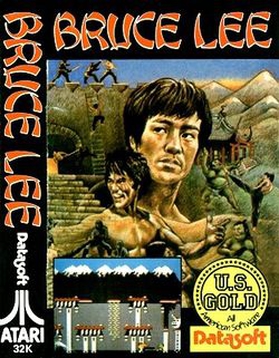
Bruce Lee is a platform game written by Ron J. Fortier for Atari 8-bit computers and published in 1984 by Datasoft. The graphics are by Kelly Day and music by John A. Fitzpatrick. The player takes the role of Bruce Lee, while a second player controls either Yamo or alternates with player one for control of Bruce Lee.
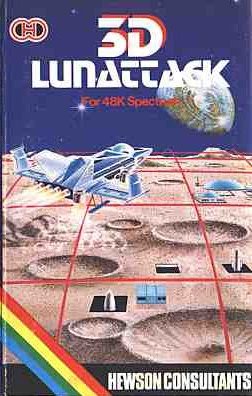
The Seiddab Trilogy is a series of video games designed by Steve Turner for the ZX Spectrum and published by Hewson Consultants. It consists of 3D Space-Wars (1983), 3D Seiddab Attack (1984), and 3D Lunattack. All three games were later published together as The Seiddab Trilogy by Hewson for the Rotronics Wafadrive. The series name is derived from the word "baddies" being spelt in reverse.
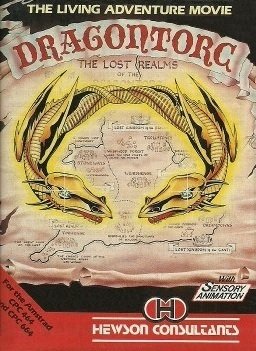
Dragontorc is an action-adventure game developed by Steve Turner's Graftgold and released for the Amstrad CPC and ZX Spectrum by Hewson Consultants in 1985. It is a sequel to 1984's Avalon The 3D Adventure Movie. The hero of Avalon, Maroc the Mage, returns to defeat an evil witch and save Britain. The game was very well received by critics.
Automata UK was a software house which developed and published ZX Spectrum video games between 1982 and 1985. Significant releases included Pimania (1982), My Name Is Uncle Groucho, You Win A Fat Cigar (1983) and Deus Ex Machina (1984).
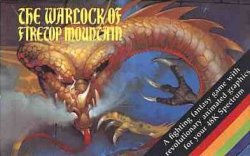
The Warlock of Firetop Mountain is an action game published by Crystal Computing in 1984 for the ZX Spectrum home computer. It is loosely based on the adventure gamebook of the same name written by Steve Jackson and Ian Livingstone, and published by Puffin Books in 1982.

Silicon Dreams is a trilogy of interactive fiction games developed by Level 9 Computing during the 1980s. The first game was Snowball, released during 1983, followed a year later by Return to Eden, and then by The Worm in Paradise during 1985. The next year they were vended together as the first, second and last of the Silicon Dreams.
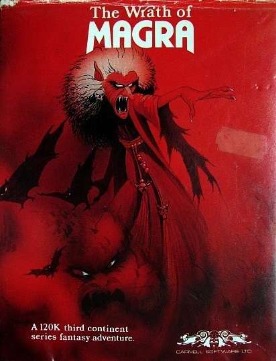
The Wrath of Magra is a role-playing video game published by Carnell Software for the ZX Spectrum in 1984. It is a sequel to 1983's Volcanic Dungeon.

Swords and Sorcery is a fantasy role playing video game developed and published by Personal Software Services. It was released exclusively in the United Kingdom for the ZX Spectrum in 1985 and the Amstrad CPC in 1986. The game contains elements of dungeon crawling and revolves around a customisable player-character navigating through catacombs in order to secure a large wealth of treasure, whilst simultaneously collecting seven pieces of sacred armour.
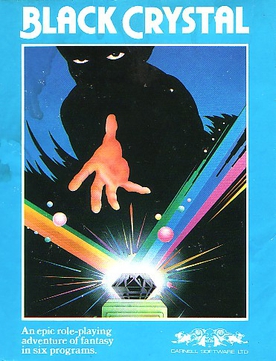
Black Crystal is an action-adventure game released in 1982 for the ZX81, ZX Spectrum, Commodore 64 and TI-99/4A computers by Carnell Software Ltd. It was the first in the "Third Continent Trilogy" of adventure games; followed by Volcanic Dungeon and The Wrath of Magra.
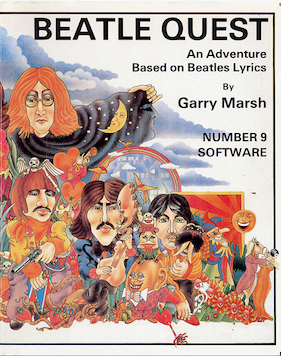
Beatle Quest is a text adventure video game developed and published by Number 9 Software. Written by Garry Marsh, the game was developed using The Quill software program. It was released for the Commodore 64 and ZX Spectrum computers in 1985.
















